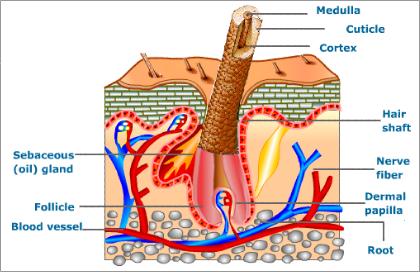The skin, which is the largest organ in the body, performs
several important duties. One of the most important is excretion. This fact
could be easily demonstrated if a coat of paint or varnish were applied all
over the body, for a person would die almost as quickly as if a dose of poison
had been given. The millions of little sweat glands, located just beneath the
surface of the skin, are constantly engaged in separating impurities from the
blood, which if retained would cause disease and eventually death.
The skin is also an organ of respiration. It absorbs oxygen
and eliminates poisonous gases, although by far most of this work is done by
the lungs. In some of the lower animals, all the work is done by the skin. The
skin not only absorbs oxygen but it also absorbs liquids to a great extent.
Absorption through the skin is increased when it is warm and moist. If a person
stays in a warm bath for some time, the weight of the body may be increased.
Seamen, when adrift on the ocean and deprived of fresh water, have been known
to wet their clothing with seawater, since the skin will absorb some of the
water without absorbing the salt.
The skin is a great help in the regulation of body
temperature. It is non-conducting and dense, which prevents to a considerable
degree the escape of essential body heat. When the body becomes overheated from
strenuous vital activity, fever, or external heat, the skin relieves the
tissues by favoring the escape of heat. This is exactly what happens in fever
when you drink plenty of water or do anything to produce perspiration. The
moisture passes from the sweat glands out onto the skin surface where it
evaporates, resulting in a powerful cooling action.
The skin is also an organ of touch; in fact, it is the
largest organ of sensitivity in the body. Through an extensive network of
nerves, the skin is very closely connected with all the great nerve centers in
the body. That is why water treatments applied to the body surface are so
beneficial and have such a good effect in disease affecting the nervous system.










